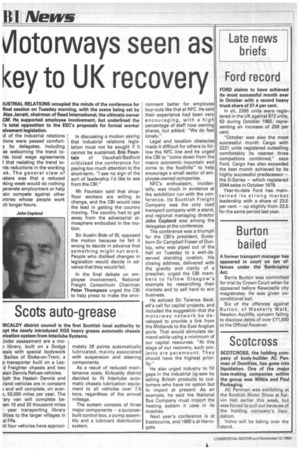Ootorvvays seen as key to UK recovery
Page 24

If you've noticed an error in this article please click here to report it so we can fix it.
/USTRIAL RELATIONS occupied the minds of the conference for final session on Tuesday morning, with the scene being set by Alex Jarrett, chairman of Reed International, the ultimate owner CM. He supported employee involvement, but underlined the l's total opposition to the EEC's proposals for formal worker olvement
ll of the industrial relations tions were passed comforty by delegates, including se welcoming the trend tords local wage agreements i that resisting the trend lords reductions in the working ek. The general view of lakers was that a reduced rking week would do nothing jenerate employment or help Ain compete against other intries whose people work ch longer hours.
In discussing a motion saying that industrial relations legislation must not be sought if it cannot be sustained, Eric Foun tain of Vauxhall/Bedford criticised the conference for paying too much attention to the short-term. "I see no sign of the sort of leadership I'd like to see from the CBI."
Mr Fountain said that shopfloor workers are willing to change, and the CBI would take the lead in getting the country moving. The country had to get away from the adversarial atmosphere embodied in the motion.
Sir Austin Bide of BL opposed the motion because he felt it wrong to decide in advance that something might not work. People who disliked changes in legislation would decide in advance that they would fail.
In the final debate on employee involvement, National Freight Consortium Chairman Peter Thompson urged the CBI to help press to make the envi ronment better for employee buy-outs like that at NEC. He said their experience had been very encouraging, with a high percentage of staff now owning shares, but added: "We do feel lonely."
Legal and taxation obstacles made it difficult for others to follow the NFC line and he urged the CBI to "come down from the macro economic mountain and come to the foothills" to help encourage a small sector of employee-owned companies.
NFC's enthusiasm, incidentally, was much in evidence at the exhibition run with the conference. Its Scottish Freight Company was the only road transport company with a stand, and regional managing director John Copland was among the delegates at the conference.
The conference was a triumph for the CBI's president, Scotsborn Sir Campbell Fraser of Dunlop, who was piped out of the hall on Tuesday to a well-deserved standing ovation. His closing address, delivered with the gravity and clarity of a preacher, urged the CBI members to follow Glasgow's example by researching their markets and to sell hard to win business.
He echoed Sir Terence Beckett's call for capital projects, and included the suggestion that the motorway network be developed to provide a link from the Midlands to the East Anglian ports. That would stimulate demand while using a minimum of our capital resources. "At this stage of our recovery, such projects are paramount. They should have the highest priority."
'He also urged industry to fill gaps in the industrial jig-saw by selling British products to customers who have no option but to import at present. As an example, he said the National Bus Company must import the heating system it uses in its coaches.
Next year's conference is at Eastbourne, and 1985's at Harrogate.








































































































































































